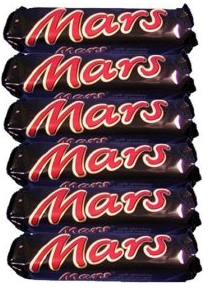Mars tests “sustainable” chocolate in Boulder
Jerry Lewis | Apr 25, 2010
Mars Inc. is expanding its test market for its new goodnessKnows dark chocolate, fruit and nut snack beyond Boulder into the Denver area, with TV advertising beginning in May.
On a global front of buying cocoa for its popular chocolate products that include M&M’s, Snickers, 3 Musketeers, Dove and Milky Way, the private family-owned business has embarked on an ambitious goal of buying only 100 percent certified sustainably grown cocoa by the year 2020.

Company representatives Suzanne Stites, cocoa flavanol platform leader, and Howard-Yana Shapiro, global officer for plant science and external research, met me in Denver to talk about why Mars chose to expand the definition of a certification program –- one that could be built throughout the world’s largest cocoa growing areas of West Africa, East Asia and South America.
The project, called “Certification Plus,” is attempting to build a coalition of the largest cocoa buyers as well as major suppliers, while also developing buy-ins by governments and the international donor community.
For Mars, the missing ingredient in a cocoa certification program, Shapiro says, was productivity.
The $13 billion global chocolate industry is huge, with demand for cocoa growing from 2 to 3 percent per year. But small rural farmers remain in poverty, with many growing only about 450 kilos of cocoa per hectare, Shapiro says.
“We had to ask ourselves, where are you going to take a stand?” he says.
Seeking a sustainable model
The Mars goal, made public about a year ago after intensive research at its Mars Center for Cocoa Science in Bahia, Brazil, started in 1982, seeks a sustainable economy model that will improve the social infrastructure of cocoa farmers with better schools and health care, maintain their “cultural milieu” while also facing up to difficult environmental and ecological challenges.
From the start, Shapiro explains, Mars was determined to make all of its findings public, including research on the cocoa bean genome, the best planting materials, soil science, fertilization and plant grafting.
At first, many people told Mars researchers and scientists they were crazy for believing they could help farmers triple their yields in 10 years, Shapiro says. But by increasing yields, Mars saw a way of actually opening more land to other production such as fruit trees, row crops and high value tropical trees, making farmers’ land more valuable and giving them an insurance policy on their future.
“The other side of intensification is diversification,” Shapiro explains. In rural areas, 75 percent of the people can spend between 65 to 75 percent of their income and still be hungry. “Hollow calories are not nutrition,” Shapiro says.
Mars has partnered with the government of Cote d’Ivoire in West Africa, commonly known as the Ivory Coast and the world’s largest producer of cocoa, and is expanding to production areas around the world.
“Can we do this alone? No,” Shapiro says. “Can we do it with just the Ivorian government? No.” Mars and other cocoa buyers need the help of the international donor community, including agencies like the World Bank, the International Finance Corp, the African Development Bank and the U.S. Agency for International Development, or USAID.
Not seeking market control
Mars isn’t contracting to control the market for a sustainably certified cocoa, Shapiro emphasizes. “Everyone has the same ability to buy these cocoa beans.”
The cost for Certification Plus? As a privately held and very private company, Mars officials say, specific numbers are not released. But Shapiro says the company has spent “tens of millions of dollars up to this point” over the past 15 years. And it will cost “tens of millions of dollars” more.
Shapiro, a University of California professor, author and expert on sustainable agriculture and agroforestry systems, is clearly determined to see the Mars’ goals become reality. “This is really the next level to a green revolution,” he says. “And the project doesn’t end in 2020, it goes on forever.”
Why is Certification Plus so important to Mars? Mars is the world’s largest buyer of cocoa bean equivalents by a company that makes a product. Some of the industry’s brokers are larger purchasers, but Mars is the largest buying manufacturer.
“Why?” Shapiro asks. “Because the Mars family recognizes that without a sustainable future, they won’t have a business for their great grandchildren.”
In 10 years, Shapiro believes every Mars chocolate product will be made from sustainable cocoa.
And that includes goodnessKnows, its new chocolate, nut, whole grain and fruit entry into the nutritional snack market. Mars says its “snacksquares” give consumers 200 mg of cocoa flavanols, proven to have health and cardiological benefits. Mars owns several patents on cocoa flavanols.
$28 billion in revenue
Mars operates 135 factories in 68 countries and has annual global revenue of $28 billion, according to company information.
Mars came to Boulder first, says Suzanne Stites, because it’s one of the “happiest and healthiest” places. The testing, with ads running in newspapers, on RTD buses and in-store samples, is now in Denver and soon will kick off TV advertising.
“It’s still early on,” Stites says, but buyers seem to like that the snack is “calorie contained at 150 calories each, and it tastes really good.”
So just one disclaimer here. I only ate one almonds and berries goodnessKnows snack (and one during the interview) while writing this column, but the samples of all three flavors – 4 snacks to a package – seem to have disappeared quickly at my house. It takes four snacks to make one 150-calorie serving, so a few more flavanols for me surely seem like a healthy idea.

